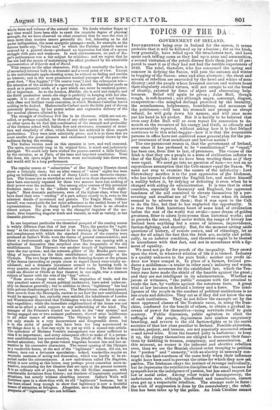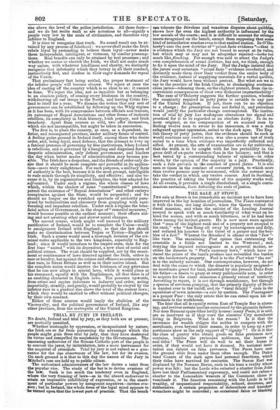TOPICS OF THE DA
GOVERNMENT OF IRELAND.
INSURRECTION being over in Ireland for the season, it seems probable that it will be followed up by a famine ; for as the Irish, very generally., have relied upon the treacherous root, and have spent such trifling sums as they had upon arms and ammunition, a second visitation of the potato disease finds them just as ill pre- pared to meet it as if they had not had the terrible experiences of 1846. The rebel, therefore, who has consumed the spring and summer in defying the Saxon, will pass the autumn and winter in begging of the Saxon: arms and alms alternate ; the shout and scream of rebellion are succeeded by the howl and whine of men- dicancy ; and the people whose favoured orators and writers boast their singularly exalted virtues, will not scruple to eat the bread of charity, extorted by force of abject and obsecrating help- lessness. Relief will again be given ; John Bull, though rough, is soft-hearted ; and although anger, contempt, disgust, exasperation—the mingled feelings provoked by the brutality, the senselessness, helplessness, boastfulness, and meanness of the petitioners—will turn his stomach and prompt an abrupt refusal, he will gulp down his nausea, and will once more put his hand in his pocket. But it is hardly to be believed that even easy John Bull will so soon repeat his concession to de- mands on the resources of his energy and thrift, so odiously and unwarrantably repeated, without askinghow it is that Ireland
i continues to be this rebel-beggar—how it s that the responsible persons in office have not contrived some general plan for the pro- per treatment of that mendicant and lawless nation
The one paramount reason is, that the government of Ireland, ever since it has professed to be " constitutional " or "equal," has been one, from first to last, of pretences. The excuse of the Irish is that they are a people in a state of civilization inferior to that of the English ; but we have been treating them as if they were equal. We need go into no question of race—we rest on no supercilious assumption that the Celt cannot equal the Saxon. We need not stop to examine the causes of the inferiority : Lord Shrewsbury ascribes it to the past oppression of the Irishman, who has learned to distrust the English law, and makes himself a nullity before it, by defying or defeating it even when he is charged with aiding its administration. It is true that in other countries, especially in Germany and England, the oppressed bondmen of the soil contrived to elevate themselves by a per- severing and steadfast use of "the law," even when its intent seemed to be adverse to them ; that it was open to the Celt to do the like, but that lie has neglected the opportunity. It is true that Irish historians boast of some kind of civilization before the rest of the world was awake—some dream of golden greatness fitter to adorn lyric poems than historical works; and so provoke the retort, that never within the range of history has Ireland been anything but a scene of idleness, improvidence, faction-fighting, and anarchy. But, for the moment setting aside questions of history, of remote causes, and of ethnology, let us once for all admit the fact that the Irish are, socially and politi- cally, in an inferior condition, and therefore ought to be treated in accordance with that fact, and not in accordance with a fig- ment of equality.
We need not go far for proofs of the inequality. They crowd upon the view, to whatever relation of life it is turned. Industry is a quality unknown to the pure Irish : neither can profit in- duce nor want compel it. In place of a farmer, Ireland pro- duces a middleman—a trader in other men's industry and wants. They have no reverence for the established law, which the Teu- tonic race have made the shield of the humble against the great ; and they are not intelligent in its administration. Whether as jurors or witnesses, "the public" conspire with the criminal to
evade the law, by verdicts o the notorious facts. A great trial at law becomes in Ireland a lottery and a farce. The intel- ligence of the people in the conduct of political institutions is no less crude and defective. They act as if they did not know the use of such institutions. They do not follow the example set by the most oppressed classes of the Teutonic races, in using the fran- chise, conferred for the benefit of others, to obtain a gradual in- crease of power for themselves—using servitude itself to gain mastery. Public discussion, public agitation to elicit the suffrages of the people, degenerates into aimless sanguinary brawling, and reverts to the old faction-fights or to the secret societies of that low class peculiar to Ireland. Forcible abduction, murder, perjury, and treason, are not popularly accounted crimes —and never were. Even the boasted piety is barbarous : to keep it up, the clergy themselves are obliged to desecrate their func- tions by dabbling in treason, conspiracy, and assassination. At this moment, no sooner is the indecent and abortive rebellion over, than we see the Romish clerical order trooping to petition for " pardon " and "amnesty," with an alacrity in unseemly con- trast to the backwardness of the same body when their influence might have been used to prevent the crime for which they now ask pardon. The Irishman obeys the instinct of revenge individually, but he deprecates the retributive discipline of the state; because he sympathizes in the indulgence of passion, but has small respect for law or social order. Among other traits of incompetency, the unfortunate race, although disaffected and tumultuous, cannot even get up a respectable rebellion. The attempt ends in farce: the work of suppression is done by the constabulary • the rebel- lion has been taken up by the police. An Irish Caaline cannot rise above the level of the police jurisdiction. All these facts— and we do but recite such as are notorious to all—signify a people very low in the scale of civilization, and therefore very inferior to England.
It is time to recognize that truth. No sound result can be at- tained by any process of falsehood : we never shall make the Irish rebels loyal by pretending to believe them loyal—never make them independent, intelligent, or virtuous, by similar presump- tions. Real benefits can only be attained by real processes ; and whether we coerce or cherish the Irish, we shall not make much way unless, with whatever kindliness and charity, we distinctly recognize that inferiority which they betray in all their conduct, instinctively feel, and confess in their eager demands for repeal of the Union.
That preliminary fact being settled, the proper treatment of the inferior people will become clearer. We reject at once the idea of casting off the country which is so close to us : it cannot be done. We reject the idea, not as impolitic but as belonging to an obsolete policy, of arming every Irishman in the country, withdrawing all our troops to the North, and leaving Celtic Ire- land to itself for a year. We dismiss the notion that any sort of government can be established by following up the Whig regime as it has been, with its compromises between officials and traitors, its patronage of Repeal Associations and other forms of inchoate rebellion, its complicity in Irish blarney, Irish perjury, and Irish treachery. Apart from courses so wild, two offer themselves,
in which are not compatible, but might be taken in succession.
The first is, to place the country, at once, as a dependent, in- ferior, and reconquered province, under military forms of control. A feeling gains ground in Ireland itself, among those who desire order, and, being loyal, need defence, that the attempt to keep up a farcical pretence of governing by free institutions, when Ireland is rebellious, and is governed by a bungling and disguised form of despotic administration, only defeats government, and hinders the day when better modes of administration may become pos- sible. The Irish have a despotism, and the friends of order only de- sire that it should be more complete and powerful in its applica- tion—more truly enlightened. For such purposes, a military form of authority is the best, because it is the most prompt, intelligible to rude minds through its simplicity, and effective ; and also be- cause it is by its organization and discipline, the best adapted for self-contra Under such a regime, the whole classes of laws which, within the shadow of some "constitutional" pretence, permit the existence of " Repeal Associations" and other embryo conspiracies against the State, would be suspended ; and we should no longer see the wretched spectacle of authority para- lyzed by technicalities and chicanery from grappling with equi- vocating and impudent rebellion. Under such a regime the bene- ficial action of Government, in the shape of" remedial measures," would become possible at the earliest moment ; their effects aid- infrhand not awaiting other and slower social changes. The second course, which might well succeed to the military pacification of Ireland, would be to complete the Union—really to amalgamate Ireland with England ; so that the law should snake no discrimination between Trojan or Tyrian—English or Irish. Such a course would need a thorough revision of the cri- minal codes applicable to the two kingdoms, especially to Eng- land; since it would introduce to the empire state, thus for the first time "united" with its dependent, a new class of social and political crimes. The want should be supplied, not by the enact- ment or continuance of laws directed against the Irish, either in race or locality, but against the crimes and offences so common with that race, in Great Britain as well as in their native island. But the complete union would deprive the Irishman of any grievance that he can now allege in special laws, while it would place at his command, equally with the Englishman, all that there is of an enabling character in English laws. The pressure upwards, from crime and supine indolence to industry and order, acting impartially, steadily, and gently, would probably be obeyed by the inferior race in a gradual rise above the level of the sterner laws ; which they would be enabled to effect without political changes, by their own conduct.
Either of these courses would imply the abolition of the Viceroyalty, and the political government of Ireland, like any other province, from the metropolis of the United Kingdom.



























 Previous page
Previous page